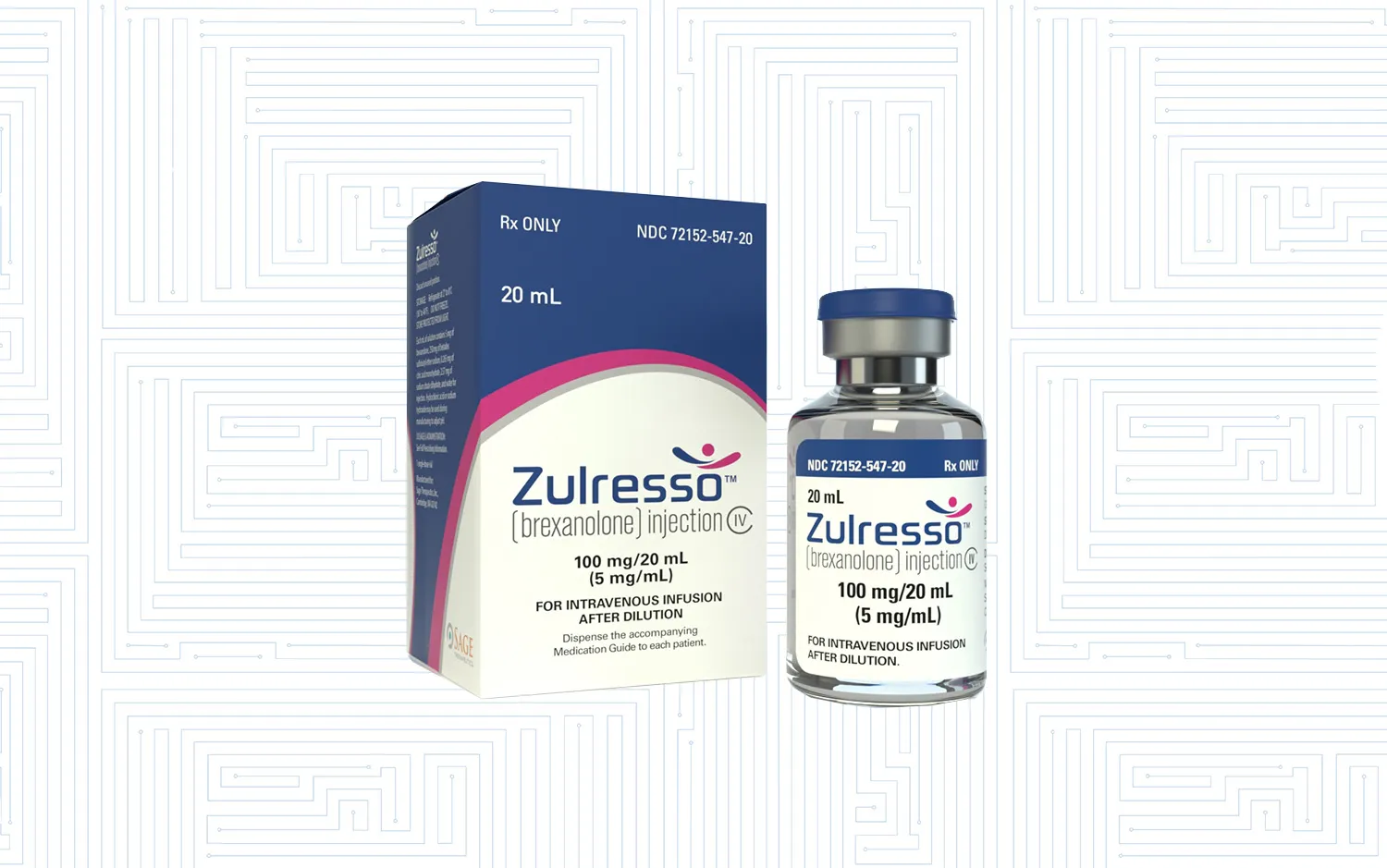

All 100 innovations for Best of What’s New 2019, this way.
Doctors and researchers spend hours attempting to understand, troubleshoot, and treat maladies. Some diseases are harder to dissect and design medications for, while others are ignored for years. This year’s newly approved drugs, treatments, and health gadgets shine a light on a few of these oft-neglected conditions and bring renewed vigor to more-mundane ones. These innovations include the first-ever drug designed specifically to treat a type of depression common in new mothers, a far better form of toothpaste, and a gadget that makes checking and controlling your blood pressure easier than ever. They also highlight our ever-improving understanding of how the human body works.

Within days of giving birth, a woman’s estrogen and progesterone levels quickly drop, leading to chemical changes in the brain that might give rise to shifts in mood. In fact, as many as three in four mothers experience symptoms of depression soon after childbirth. But for one in nine mothers, those symptoms result in a more serious, longer-lasting, and potentially life-threatening condition known as postpartum depression. The disorder, which manifests as a significant change in mood within hours to weeks of giving birth, is the most common complication of pregnancy. Currently, the depression drugs used to treat it take weeks to months to kick in—time that new mothers (and their infants) can’t afford. Zulresso is the first FDA-approved medication designed to tackle postpartum depression, and it does so at speed. The drug is a synthetic form of allopregnanolone, a hormone that dampens neural activity and eases depression symptoms when estrogen and progesterone levels dip. In double-blind control studies run by the creators at Sage Therapeutics, Zulresso worked within 60 hours. Right now, the drug is administered via a 60-hour intravenous infusion (common among new medicines), but alternative treatments, including a pill form, are currently in clinical trials.

Getting kids to the doctor for their scheduled vaccinations can be a figurative and literal pain. But missed or delayed shots might put children—and their friends and classmates—at risk of contracting dangerous infectious diseases. Vaxelis by pharma giants Sanofi and Merck is the first shot that protects against six different transmissible diseases: Haemophilus influenzae type b, poliovirus, hepatitis B, diphtheria, tetanus, and pertussis. It’s given in three doses when infants are 2, 4, and 6 months old (kids up to 4 years old can still get it). Compared to current regimens, it demands up to four fewer injections, letting pediatricians give more attention to other childhood needs.

About 75 million American adults have high blood pressure, also called hypertension, according to the Centers for Disease Control. But only about half that group have the condition under control, even though it puts them at risk of heart attacks, strokes, and kidney disease. Constant vigilance can help: With HeartGuide, the first FDA-approved smartwatch, people can track their pressure at any time. The device features an inflatable strap that functions just like a blood pressure cuff. It registers readings in 30 seconds, and saves the last 100 stats so users can see trends and share them with their doctors.

Vacations are one of the finer pleasures in life, but hitting the road often comes with risks. Traveler’s diarrhea, though common and inconvenient, can lead to more-serious conditions if not treated right away. To do so, doctors often turn to broad-spectrum antibiotics, which, when used inappropriately, can lead to resistance. Aemcolo is an antibiotic pill that is now approved in the US to counter the most common noninvasive strains of E. coli, which are the most frequent causes of traveler’s diarrhea. It targets the colon rather than the bloodstream to keep resistance down.

Menstrual bleeding that’s heavy or lasts for more than a week can lead to iron-deficiency anemia, a potentially dangerous condition. Usually, methods to treat it include surgical procedures performed under general anesthesia, but Channel Medsystems offers a new option that skips the scalpel. The Cerene Cryotherapy Device freezes areas of the uterine lining to significantly reduce bleeding during future periods. The procedure is just as effective as current methods and can be performed safely in a gynecologist’s office without anesthesia.

Since CRISPR—the easy-to-use gene-editing tool—first blasted onto the biotech scene, experts have been employing it in research to attempt to treat mutation-based diseases. In July 2019, a team edited the DNA of an American woman with sickle cell anemia—a first. Individuals with sickle cell lack the protein necessary to produce healthy red blood cells, which makes it hard for oxygen to flow through the body. Doctors first removed stem cells from the woman’s bone marrow. Then, they genetically modified them using CRISPR to make them produce a protein that makes healthy red blood cells but whose production is typically shut down shortly after birth. The procedure was successful, but researchers need time—at least two years—to know how it will hold up in the long run.

Birth control pills are incredibly effective at regulating hormones and preventing pregnancy—but they can also be a hassle. The daily synthetic hormones require repeated trips to the pharmacy and a tight regimen; and other forms of birth control, like IUDs or implants, often entail long, multi-year commitments. Annovera is the first year-long reusable implant that women can remove and reinsert on their own and when they chose. It’s an about 2-inch-wide vaginal ring that releases synthetic forms of estrogen (which suppresses ovulation) and progesterone. The device remains in place during sex and lasts for a full year, providing more autonomy over when and how users choose to utilize it.

Dentists are right: Fluoride is great for your teeth. It strengthens and remineralizes enamel, which prevents cavities and even reverses early tooth decay. Currently, most toothpastes come with a fluoride formulated with sodium. Colgate’s Total SF contains stannous fluoride, a far more potent version of substance, which in addition to strengthening enamel, acts as an antimicrobial against the bacteria that lead to bad breath, and protects teeth and gums from tartar buildup, gingivitis, and sensitivity. Until now, researchers have been unable to stabilize stannous fluoride without making the product stain teeth yellow and dark brown. Total SF uses a unique system of inactive zinc phosphate to handle the tricky element. This ensures your pearly whites stay both cavity-free and bright.

For the one in five people in the US whose depression defies all treatments, a new medication is here. This year, the FDA approved the drug Spravato, the first new drug for severe depression in decades and a derivative of the powerful anesthetic ketamine. While the mechanism is still not completely understood, researchers think it helps depression symptoms by restarting the growth of synapses, which connect neurons. It takes effect far more quickly than current antidepressants such as Prozac, which target serotonin receptors and take weeks or months to kick in. Currently, the Spravato nasal spray is being used for treatment-resistant depression in conjunction with these traditional antidepressants. Patients had a greater reduction of their symptoms at four weeks compared to those who took traditional antidepressants only.

It’s easy for a police officer to quickly identify drunk drivers with a breathalyzer, but checking for other illicit drugs poses more of a challenge: It requires a blood test that takes hours to analyze off-site. But what if a little spit could seal the deal? SoToxa is a handheld diagnostic tool that officers can use to test saliva for marijuana, cocaine, opiates, amphetamines, methamphetamines, and benzodiazepines in the field. The results arrive in about five minutes. In a pilot test on 92 samples, performed through the Michigan State Police program, SoToxa proved to be just as accurate as independent blood tests.

Peanut allergy is the second-most common food allergy for kids in the US, and the affected population continues to grow. It’s also the most likely to cause anaphylaxis, but no treatment currently exists. Aimmune Therapeutics’s Palforzia is a daily pill that contains small doses of the peanut protein that many people have a deadly reaction to. The amount is steadily increased over months so that the body can tolerate it in larger concentrations, such as in trace amounts in food. The drug won’t cure the allergy, but it will significantly reduce the chances of a life-threatening reaction. An FDA committee recommended the drug for approval for ages 4 to 17 in September, which means it should be prescribable for nearly 1.6 million kids soon.